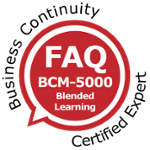Understanding Classic Fine Foods Malaysia in the Context of BCM: A Strategic Guide to Business Continuity Planning
Chapter 3
Establishing Organisational Goals for Implementing BCM
Introduction
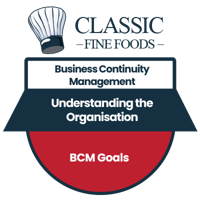 In an era when disruptions—whether from natural disasters, supply chain failures, or cyberattacks—are increasingly inevitable, Classic Fine Foods (CFF) Malaysia must prioritise resilience.
In an era when disruptions—whether from natural disasters, supply chain failures, or cyberattacks—are increasingly inevitable, Classic Fine Foods (CFF) Malaysia must prioritise resilience.
Implementing a Business Continuity Management System (BCMS) aligned with ISO22301 is not merely a compliance exercise but a strategic imperative.
This article explores how CFF Malaysia can establish clear organizational goals to anchor its BCMS, ensuring alignment with ISO22301 requirements while safeguarding its reputation, operations, and customer trust in Malaysia’s dynamic food distribution landscape.
The Role of Organisational Goals in ISO22301 Compliance
 ISO22301 emphasises the need for organisations to define measurable objectives that drive continuity planning. For CFF Malaysia, goals act as a roadmap to:
ISO22301 emphasises the need for organisations to define measurable objectives that drive continuity planning. For CFF Malaysia, goals act as a roadmap to:
-
Minimise downtime during disruptions, ensuring uninterrupted delivery of perishable goods.
-
Protect critical business functions and operations, such as cold chain logistics and supplier relationships.
-
Meet regulatory requirements, including Malaysia’s Food Safety Regulations and international export standards.
-
Enhance stakeholder confidence by demonstrating preparedness for crises.
Without well-defined goals, BCM efforts risk becoming fragmented, reactive, or misaligned with business priorities.
Steps to Establish Effective BCM Goals
Understand Organisational Context
Begin by analysing CFF Malaysia’s unique risks and operational dependencies. For example:
-
Supply chain vulnerabilities: Reliance on imported ingredients or third-party logistics.
-
Regulatory pressures: Compliance with Halal certification, food safety audits, and customs protocols.
-
Market-specific risks: Monsoon seasons impacting transportation or regional economic shifts.
ISO22301 Requirement: Clause 4.1 mandates understanding internal/external factors influencing BCM.
Align Goals with Strategic Objectives
BCM goals should support CFF Malaysia’s broader mission—e.g., “Delivering premium gourmet products across Southeast Asia without compromise.” Example alignment:
-
Strategic Objective: Expand market share in Singapore.
-
BCM Goal: Ensure 99.9% availability of cross-border logistics systems to prevent delivery delays.
Secure Leadership Commitment
Top management must champion BCM goals, integrating them into governance frameworks. For CFF Malaysia, leadership could do the following:
-
Allocate budgets for backup cold storage facilities.
-
Approve quarterly BCM training for procurement and logistics teams.
ISO22301 Requirement: Clause 5.1 highlights leadership’s role in fostering a continuity culture.
Define SMART Goals
Ensure goals are Specific, Measurable, Achievable, Relevant, and Time-bound:
-
Weak Goal: “Improve crisis response.”
-
SMART Goal: “Reduce recovery time for IT systems from 24 hours to 4 hours by Q3 2024.”
Sample Goals for CFFM
| Goal | Metric | Timeline |
|---|---|---|
| Achieve 100% staff BCM awareness | Annual training completion rate | Q4 2025 |
| Mitigate supplier risks | Dual-source 80% of critical ingredients | Q2 2025 |
| Maintain cold chain integrity | Zero temperature breaches during disruptions | Ongoing |
Integrate Risk Assessment Outcomes
Leverage CFF Malaysia’s Business Impact Analysis (BIA) and risk assessments to prioritize goals.
For instance, if the BIA identifies IT system failures as high-risk, a goal could be to enhance IT disaster recovery capabilities.
Communicate and Monitor Progress
-
Internally: Share goals via town halls, KPIs in performance reviews, and dashboards.
-
Externally: Inform suppliers and partners of contingency expectations.
-
Review: Conduct biannual audits to assess goal attainment and adjust as needed.
ISO22301 Requirement: Clause 9.1 emphasizes monitoring, measurement, and evaluation.
Summing Up ...
Establishing robust organisational goals is the cornerstone of a resilient BCMS for Classic Fine Foods Malaysia.
By anchoring these goals in ISO22301’s framework, CFF Malaysia can transform business continuity from a theoretical plan into actionable, measurable outcomes.
As Malaysia’s food industry evolves, proactive goal-setting will ensure that CFF Malaysia remains a trusted partner capable of thriving amid adversity.
This chapter is part 1 of the eBook "Driving Business Continuity: Implementing BCM for Classic Fine Food Malaysia." It is titled "Understanding Classic Fine Foods Malaysia in the Context of BCM: A Strategic Guide to Business Continuity Planning", which provides a comprehensive guide to implementing a BCM system in alignment with ISO 22301
| Driving Business Continuity: Implementing BCM for Classic Fine Food Malaysia | |||
| Understanding CFF Malaysia in the Context of BCM: A Strategic Guide to BCP | |||
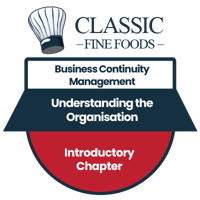 |
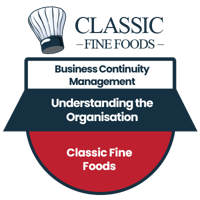 |
 |
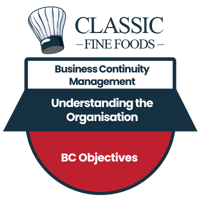 |
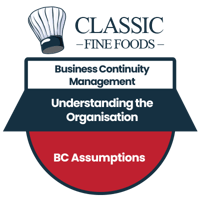 |
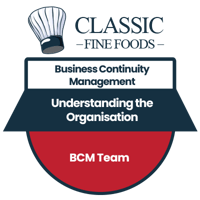 |
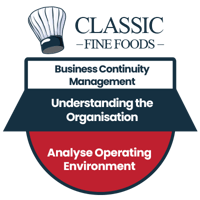 |
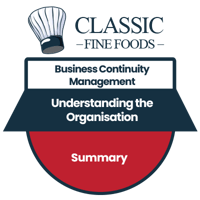 |
More Information About Business Continuity Management Courses
To learn more about the course and schedule, click the buttons below for the BCM-300 Business Continuity Management Implementer [BCM-3] and the BCM-5000 Business Continuity Management Expert Implementer [BCM-5].




![Register [BL-B-3]*](https://blog.bcm-institute.org/hs-fs/hubfs/hub_generated/resized/19a8306f-6b76-45ff-8585-95111f393aeb.png?width=200&height=56&name=19a8306f-6b76-45ff-8585-95111f393aeb.png)



![FAQ [BL-B-3]](https://blog.bcm-institute.org/hs-fs/hubfs/hub_generated/resized/9b7f5669-8ad6-450b-a98f-5f5d49ebfc8e.png?width=150&height=150&name=9b7f5669-8ad6-450b-a98f-5f5d49ebfc8e.png)
![Email to Sales Team [BCM Institute]](https://blog.bcm-institute.org/hs-fs/hubfs/hub_generated/resized/83ae9ad3-affc-416e-8f51-64218d6d98f2.png?width=100&height=100&name=83ae9ad3-affc-416e-8f51-64218d6d98f2.png)
